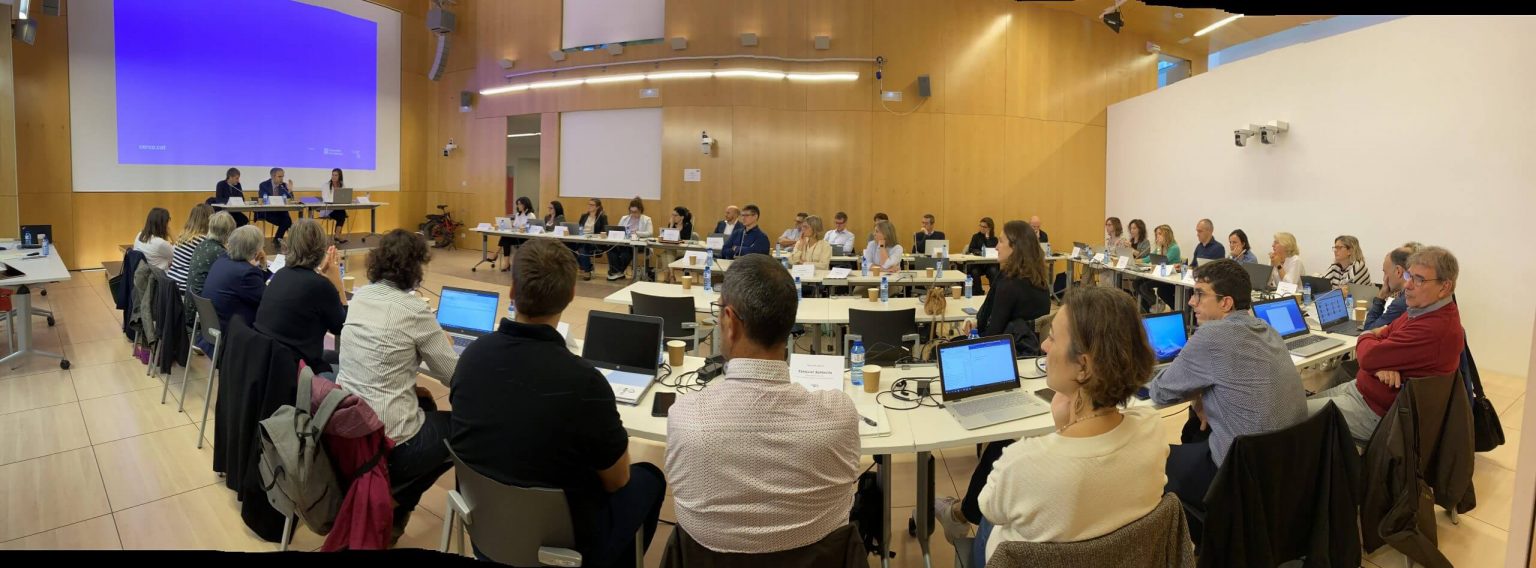The ÀGORA programme
The CERCA Institute has launched ÀGORA, an unprecedented and innovative programme for the managers of CERCA centres. ÀGORA focuses on management training and the strategic challenges in managing research and innovation. It does so by creating a community that draws on the professionals themselves to connect, share, debate, accompany, learn and create good practices within and beyond the CERCA community. The ÀGORA community is a catalyst for excellence in management and also a forum for networking to find joint systemic solutions to common individual challenges.
The role of managers in the context of CERCA centre governance
The high degree of specialisation in research organisations and the prestige that comes from having active scientists as directors of these organisations explain the specific nature of governance of research organisations and universities both nationally and internationally, and in particular the CERCA centres, which have two management figures: the (scientific) director and manager.
The CERCA centre management and governance model is designed to achieve the centres’ main mission, which is to conduct research of international excellence. CERCA centres are legally autonomous and their management model is based on flexibility and agility, stable funding through multi-year framework agreements and external assessments by external and international panels. They have effective governance involving managers with broad powers granted by the Board of Trustees, the governing body. The scientific directors of the CERCA centres are active, high-level scientists who lead their own research groups and are selected on their scientific merit and international track record. Unlike the directors of other bodies (private companies, non-profit organisations and even hospitals in Catalonia), research centre directors in Spain and, in particular, at CERCA centres do not work full-time on management functions, but combine their managerial duties with their research functions, their main activity.
This context helps explain the role of research centre managers. With broad powers and a strategic and institutional vision of the organisation, the CERCA centre managers work full-time on the executive and professional management functions for the centre. These are complementary functions to those of the directors, who work in scientific management and also perform executive functions, usually representing the centre externally, while managers tend to play a more internal role.
However, the figure of the manager as the number two in the organisation, similar to the Anglo-Saxon figure of the chief operating officer (COO), is often misunderstood and misinterpreted[1]. It is true that there is no single definition of the role of manager. There is significant diversity among the CERCA centres themselves, determined by the size and type of centre, historical factors and legal stipulations in their statutes. But, above all, the role of manager is largely determined by his or her relationship with the director as an individual, and his or her leadership style and management experience. In many cases, the managers’ chief role is to help turn the strategic vision of directors into reality. This is why the director-manager tandem is the key to good governance and effective management of CERCA centres.
What are the functions of the CERCA managers?
How does this role translate into the functions of managers? On a more theoretical level, managers perform the management functions traditionally associated with the five basic functions described by management theorist Henri Fayol[2]: planning (analysing the future and designing a plan of action); organising (providing financial, material and personnel resources); commanding (guiding and directing people to achieve the organisations objectives); coordinating (unifying and harmonising efforts and activities to direct them towards the overall objectives) and controlling (supervising activities so they are carried out according to plan, as well as reporting and correcting deviations). The management and leadership functions are essential to the success of organisations, yet they are often invisible and undervalued. In our field, the Anglo-Saxon term “management” is often equated with “administration” and sometimes with “bureaucracy”, terms that have a negative connotation and must be clearly differentiated from the management functions performed by managers. This negative perception of management functions, sometimes due to ignorance, has increased in recent years, coinciding with the increased application of regulations that are more appropriate for government bodies than research organisations, as the latter require greater agility and flexibility to be competitive.
In this sense, applying these regulations has had a devastating impact on both state and Catalan research organisations. The role of CERCA managers, especially in centres set up as public foundations, has also been significantly eroded. Networking to reverse the difficulties arising from the restrictive regulatory framework is paramount and this is where the ÀGORA programme has a key role to play.
CERCA centres have become highly internationalised, both in terms of the talent within them and in their partnerships and research projects, which are based on scientific excellence and need to be internationally competitive. For this reason, applicable legislation needs to be more streamlined and similar to that of the benchmark countries with which they compete. Thus weakening the autonomous system of Catalan CERCA centres and applying a restrictive state regulatory framework is highly significant with regard to the international competitiveness of CERCA centres. The Catalan Law on science , which is at an advanced stage in parliamentary proceedings, could be instrumental in reversing the weakening of CERCA centre autonomy. In national terms, there has also been growing concern in the scientific community regarding the numerous restrictions arising from basic legislation that jeopardises the competitiveness of science (in particular, budgetary, labour and public procurement rules). Research centres that receive public funding are committed to working with criteria stipulating efficiency and rigour, an orientation to results, transparency and a firm commitment to accountability toward funders and society. But there is also a need for specific and appropriate state and regional regulations within the framework of European directives to safeguard the competitiveness of the sector, as is already the case in other countries. Having said that, the challenges facing the R&D system go beyond regulatory constraints and include, among other things, the endemic problem of underfunding for research, technology transfer, lack of private investment and attracting and retaining talent. The Spanish Law on science[3] passed this year aims to address some of these issues, but there is still some way to go.
In this legal context, managers have had to direct part of their efforts towards cushioning the impact of such regulations on their organisations and defending the autonomy of the CERCA centres, pushing their main role of management and guaranteeing management excellence, as well as drivers and facilitators, into the background. This has meant the director-manager tandem constantly has to make trade-offs to maintain the level of excellence of their institutions and their international reputation within these constraints. Managers play a particularly complex role, switching between responding to researchers’ needs within existing regulatory constraints and meeting their responsibilities to funding agencies and employers as guarantors of the institutions’ interests.
Beyond the theoretical blueprint of management functions and the difficulties arising from a restrictive regulatory framework, the reality is that managers play many notes in their day-to-day work, on a wide palette of tones. Managers bring operational effectiveness and strong leadership to operations and management teams with the aim of ensuring excellence in managing the organisation. Above all, they act as a link between scientific strategy and operations to ensure the scientific vision can be translated into the operational plan. With this strategic vision and operational capability, managers also play an instrumental role in turning crises into opportunities and in building more resilient and sustainable organisations.
In such a complex and dynamic context, the CERCA Institute ÀGORA programme seeks to support managers and accompany them in this exciting yet challenging role, which is also essential for CERCA centres. The ÀGORA community is a catalyst for excellence in management and also a forum for networking to find joint systemic solutions to common individual challenges.
ÀGORA as a learning and best practice community of CERCA managers
The first ÀGORA programme is now beginning, with the aim of accompanying CERCA managers over the next eight months and then continuing as an on-going training programme. It is not static, covering all the contents a CERCA manager needs in order to carry out their functions successfully; rather, it is a dynamic programme, which will gradually incorporate new contents and formats in an exercise of experimentation and co-creation within the community. Furthermore, with the aim of training new generations of CERCA managers and guaranteeing succession plans in the institutions, an assessment committee has selected a small number of professionals who have the potential to occupy CERCA managerial positions in the future and who will join the ÀGORA community.
The programme has a quality teaching team made up of highly experienced trainers and facilitators, national and international experts from prestigious research organisations and representatives of the heads of science policy in the European Commission, the Spanish Ministry of Science and Innovation and the Generalitat de Catalunya Ministry of Research and Universities. Finally, it is also worth highlighting the partnership established with the Public Administration School of Catalonia with regard to the Mentoring Programme, a benchmark in accompanying managers, which began four years ago to support and accompany new incorporations in the group of CERCA managers.
ÀGORA is structured into five separate blocks:
- The programme begins with a transformative two-day FranklinCovey course on leadership, with the aim of developing and reinforcing leadership and management development competencies for CERCA centre managers. This block discusses the four essential roles leaders play to make their work more effective, which are also excellent predictors of success: inspiring trust, creating vision, executing strategy and developing potential. It therefore provides managers with specific tools for their role as leaders of the management team, which usually includes departments such as finance and purchasing, IT, communications, human resources, health and safety, legal advice, general services, and the department of research projects and grants.
- The second block includes a number of monthly sessions on strategic challenges in research management. It combines highly relevant topics for managers’ roles in terms of both strategy and operations, and will serve as an opportunity to share, learn, debate, inspire and generate good practices and knowledge among the management community. This block covers the bridging and linking role that managers play between strategy and management within organisations. It includes topics such as the major legislative reforms in science in 2022, new initiatives within European research policies, best practices in equality, diversity and inclusion strategies, the fundamentals of technology and knowledge transfer. Tools for designing a balanced scorecard will also be presented and discussed. Also worth mentioning in this block are the two major transitions (green and digital) and their application in the field of research management: the implementation of the Sustainable Development Goals and the tools to build a roadmap for digital transformation in research centres.
- The third block is on peer mentoring and consists of a pilot programme working with a small number of people to foster the development of professional skills and competencies based on experience and case studies presented during the sessions. These sessions are not thematically oriented and can cover a very broad set of cross-cutting issues of managers’ day-to-day work that are difficult to categorise and can generally cover the challenges of people leadership and crisis and incident management, but should also serve as a chance to share and appreciate managers’ good practices and achievements. Peer mentoring groups are very effective in accompanying and reducing “manager loneliness”. In the ÀGORA programme, training and recreational activities will be combined to build a strong community that will serve as a space to debate, inspire, share and generate good practices, which we hope will also serve as inspiration and be useful outside the CERCA community (community building).
- Finally, the last block, on mentoring and new incorporations, aims to support new incorporations and accompany them through the Public Administration School of Catalonia (EAPC) Mentoring Programme, to which they will have access. This ensures faster and more effective learning and integration for new professionals with benefits for both the professionals themselves and their institutions.
In short, ÀGORA is an unprecedented and innovative programme for CERCA centre managers, while also serving as a tribute to and recognition of their tireless and often invisible work and contribution they make together with their management teams in keeping their institutions at the forefront of their respective fields.
[1] Nate Bennet, Second in Command: The Misunderstood Role of the Chief Operating Officer. HBR.
[2] The fourteen principles for management developed by Henri Fayol in Administration industrielle et générale (1916).
[3] Law 17/2022 of 5 September amending Law 14/2011 of 1 June on science, technology and innovation.



